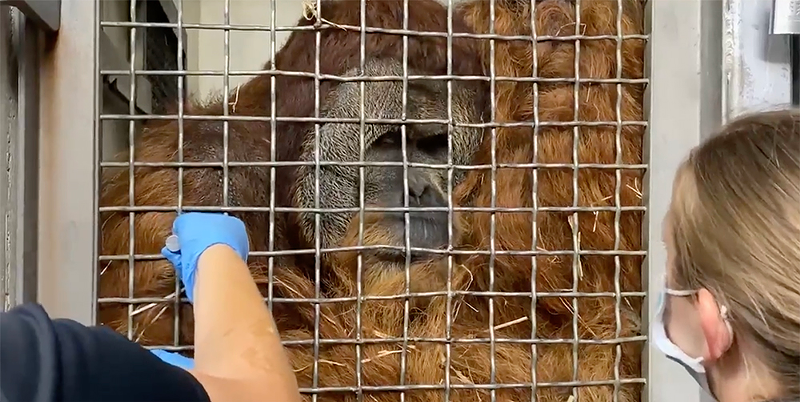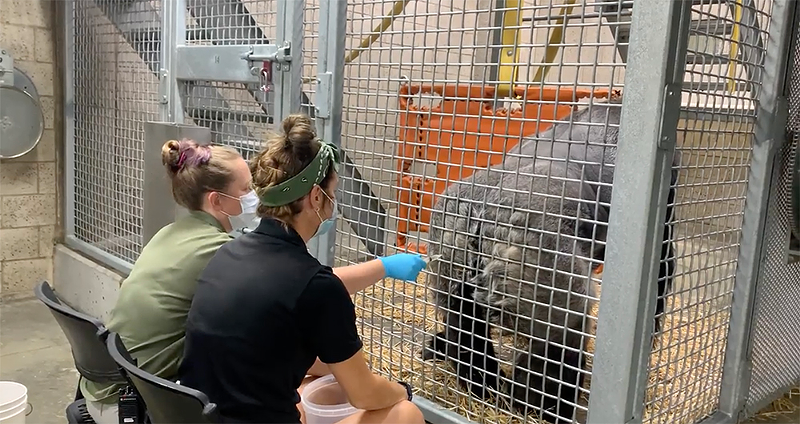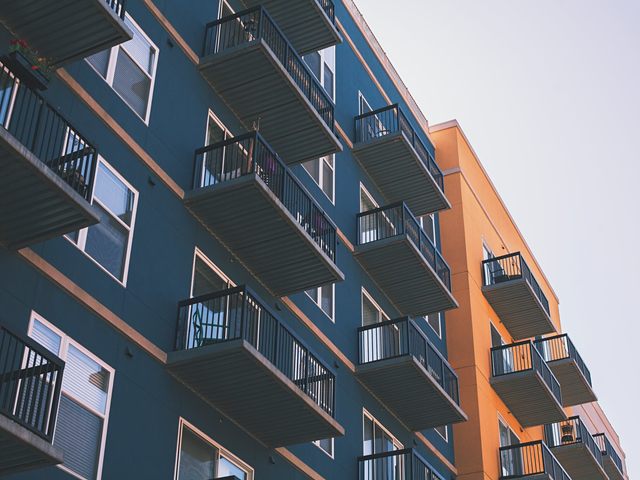As the U.S. fell just short of President Biden's goal of vaccinating 70% of its human population against COVID-19 by July 4, the Cincinnati Zoo & Botanical Garden is getting ready to start a vaccination program of its own — but this time it's for animals.
International animal health company Zoetis is donating more than 11,000 doses of its COVID-19 vaccine to nearly 70 zoos across America. And the Cincinnati Zoo is one of them, says the zoo's director of animal health, Dr. Mark Campbell, in a video message.
The special two-dose SARS-COV-2 vaccine, which has been approved for experimental use by the United States Department of Agriculture, will arrive at the Cincinnati Zoo later this summer. The first zoo residents to receive the vaccine will be those who have been found to be more susceptible to the virus, including big cats, gorillas and other mammals who have close interactions with humans, according to the zoo.
The Oakland Zoo began vaccinating its high-risk animals — tigers, black bears, grizzly bears, mountain lions and ferrets — with the Zoetis vaccine on June 30 and all are "doing great post-vaccine," Erin Harrison, a spokeswoman for the zoo, told CNN.
The Zoetis coronavirus vaccine is specifically made for animals, not humans.
“When the first dog was infected with COVID-19 in Hong Kong last year, we immediately began to work on a vaccine that could be used in domestic animals, and in eight months we completed our initial safety studies," says Mahesh Kumar, senior vice president of Global Biologics at Zoetis. "While thankfully a COVID-19 vaccine is not needed in pets or livestock at this time, we are proud that our work can help zoo animals at risk of COVID-19.”
To prepare for the vaccine, Cincinnati Zoo care teams have been working with the animals to train them to voluntarily receive the shot.
“We’ve already started training some animals, such as gorillas, for voluntary injection training,” says Cincinnati Zoo’s director of animal sciences, David Orban, in a release. “This allows those animals to voluntarily participate in their own preventative health care and eliminates the risks associated with anesthesia.”
They use operant conditioning — in this case, the animals do something the trainers need them to do, like receive a shot, and they get positive reinforcement.
"A big part of that training is to condition those animals is to voluntarily accept a hand injection," says Campbell. "And we use that frequently to administer normal vaccines that we have as part of the preventative medicine program we have here at the zoo."
For example, Fiona the hippo has been trained for voluntary blood draws and the zoo's giraffes have been trained to present their hooves for foot care.
"I think the biggest difference — and the same difference with people — is that this is a two-dose vaccination," says Campbell. 'It's always much harder to get people to comply with the second dose of the vaccine, and it's going to be equally as complicated for our animals to accept that vaccine."
The order in which the animals will receive the vaccine has yet to be determined, and the zoo says it depends "on the status of animals’ injection training" when the doses arrive. The Zoetis vaccine also needs to be carefully stored and used within a certain expiration period.
“Our animal health team will have a carefully planned strategy mapped out once we get started,” says Orban. “They have been in close contact with Zoetis and other zoos that have administered shots to their animals.”
The Cincinnati Zoo stepped up COVID precautions for its animals in April 2020 after a 4-year-old female Malayan tiger at the Bronx Zoo named Nadia tested positive for the virus. Nadia's sister, two Amur tigers and three African lions at the zoo also developed symptoms of respiratory illness (they were not tested because the zoo did not want to risk putting them all under general anesthesia).
The Bronx Zoo said the animals were infected by an asymptomatic caretaker, and the USDA said that the virus' leap from zookeeper to big cat was the "first case of its kind."
At that time, the Cincinnati Zoo said it was "proactively stepping up distancing and safety measures in animal areas and throughout the zoo."
Companion animals such as dogs and cats have contracted the virus, as have gorillas, mink and other big cats, says the Centers for Disease Control and Prevention (CDC). Many animals have recovered, but in some cases, like on mink farms, thousands of animals were killed to prevent the risk of a COVID variant being transmitted to humans.
The Cincinnati Zoo has lifted mask requirements for guests, unless they are in areas with close contact between humans and animals, like giraffe feedings or visiting the goats in the barnyard.
Watch how the zoo trained its meerkats to prepare for the vaccination below:







